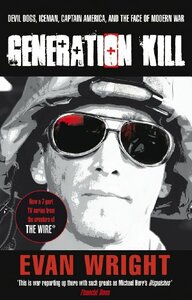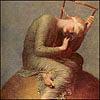You need to sign in or sign up before continuing.
Take a photo of a barcode or cover
This book hit me really hard. I was completely engrossed in it, but I had to keep stopping to think over certain events, and sometimes to recover because I'd experience such a palpable sense of waste and sorrow. But I appreciate that Wright comes to the material in a nonjudgemental way - the violence and the farce of war are balanced with the moral ambiguities the soldier's face, their own doubts and reactions to some of the more troubling events - and that he doesn't airbrush the truth of the war, the bizarre bureaucratic bungles, the egos, the cost. And he has a great eye for drawing the different personalities of the First Recon team, the parts of them that allow them to serve in this way, to obey orders, to kill and to even lust after the thrill of what they do. It's a disturbing and a humanising read all at the same time.
Much better than it's counterpart, "One Bullet Away" but this would make sense as bullet was written by a marine officer, and generation kill by a rolling stone journalist.
adventurous
challenging
dark
emotional
funny
inspiring
sad
tense
medium-paced
Evan Wright is a modern day Stephen Ambrose as far as his ability to write about individuals in modern war.
Wright's book covers First Recon's time in Iraq. While I did not know this when I began, it actually covers the same platoon as One Bullet Away, which was written later by one of the Lieutenants that Wright Focuses on in this book. I was able, then, to compare the stories that each told. There is very, very little contradictory information here. One difference is that Wright, being a journalist, was/is freer to say what he thinks than a guy who was/is serving. For example, Nathaniel Fick, author of One Bullet, refers only tangentially to a commanding officer who liked to bring a Benelli shotgun into combat, and refers generally to what a f***-up he was. Wright names the guy, and also gives specific examples, like the shotgun-toting CO firing at nearby unarmed civilians (and killing them), and gives several examples of trigger- or combat-happy (or maybe just scared) f***ups in leadership positions.
Fick's book leaves you angry at a general culture. Wright's book leaves you angry at individual actions (and made this reader realize that he does not have what it takes to be a mid-level officer in the military, simultaneously responsible for the lives of the men and women under your command, while beholden to people who are thousands of miles away from the battlefield). Yeah, Fick and his NCOs are better, more patient people than I am, and I bow in recognition of that fact.
Wright paints a picture of a military that is as it has probably always been: peopled by a cross-section of the country, with a bit of weighted participation from certain groups, mostly young men (and a few women, at least for combat roles at the time of publication), almost all of whom are scared, of differing opinions, motives, and levels of intelligence. The author is seemingly surprised to find anti-war or anti-American sentiment in the military, but this is a volunteer force comprised of, again, a cross-section of the country. There will be hawks, and philosophers, and stoners, and ordinary working joes who do it for a paycheck.
The descriptions of men, actions, and conditions is just fantastic, colorful enough to give the reader a pretty clear picture of what the author was seeing (and part of the high rating). The author lived through combat in vehicles that were getting shot up, without ever going Geraldo or Rambo, or claiming to have singlehandedly manned a turret gun and mowed down enemy combatants. He does an admirable job of remaining an observer, telling the stories of those around him, and not his own experience (as much as one can do so when experiencing some of the most exhilarating moments of one's life).
I recommend reading this book as part of a two-fer, doing this one first and then One Bullet, to get an idea of how a more liberal-leaning reporter views events vis-a-vis a lieutenant commanding troops. Both are well-done. This book paints a more colorful picture and has better writing overall.
Fick's book leaves you angry at a general culture. Wright's book leaves you angry at individual actions (and made this reader realize that he does not have what it takes to be a mid-level officer in the military, simultaneously responsible for the lives of the men and women under your command, while beholden to people who are thousands of miles away from the battlefield). Yeah, Fick and his NCOs are better, more patient people than I am, and I bow in recognition of that fact.
Wright paints a picture of a military that is as it has probably always been: peopled by a cross-section of the country, with a bit of weighted participation from certain groups, mostly young men (and a few women, at least for combat roles at the time of publication), almost all of whom are scared, of differing opinions, motives, and levels of intelligence. The author is seemingly surprised to find anti-war or anti-American sentiment in the military, but this is a volunteer force comprised of, again, a cross-section of the country. There will be hawks, and philosophers, and stoners, and ordinary working joes who do it for a paycheck.
The descriptions of men, actions, and conditions is just fantastic, colorful enough to give the reader a pretty clear picture of what the author was seeing (and part of the high rating). The author lived through combat in vehicles that were getting shot up, without ever going Geraldo or Rambo, or claiming to have singlehandedly manned a turret gun and mowed down enemy combatants. He does an admirable job of remaining an observer, telling the stories of those around him, and not his own experience (as much as one can do so when experiencing some of the most exhilarating moments of one's life).
I recommend reading this book as part of a two-fer, doing this one first and then One Bullet, to get an idea of how a more liberal-leaning reporter views events vis-a-vis a lieutenant commanding troops. Both are well-done. This book paints a more colorful picture and has better writing overall.
So insanely good. I've seen the miniseries multiple times and finally decided I needed to pull the trigger on finally reading this. It did not disappoint.
Absolutely marvelous. It added another layer or dimension on to the article and the TV series. I couldn't put it down. Engaging, harrowing, humorous. Wonderful.
dark
sad
medium-paced
Not my usual read but I really enjoyed it! Definitely changed my perception of the recent wars and the soldiers themselves. Very sobering and highlights the stupidity of war without feeling like a pro-pacifism book. Definitely would recommend, a fun and well paced read that keeps you interested.
after seeing stark sands in american idiot on broadway i was seized by an intense need to do nothing but watch him in anything anywhere - which led me to finally finish watching the seven-part HBO miniseries based on this book, which led to me finally finishing the book that HBO sent me a couple years back when they were promoting the series. (i'd actually read the rolling stone articles on which the book was based when they were first published, my only timely achievement.)
it probably helped to read this as a companion to the HBO series - i always struggle a bit in war shows to tell one buzzcut white guy from another - but it also left me so impressed with the adaptation from book to screen. not so surprising, given the show was made by david simon & ed burns of the wire/treme, two men who undeniably know how to dig into a subculture and just let you eavesdrop, even if it doesn't always make sense or flow like you'd expect a story to.
there's more of evan wright, the reporter, in the show - he's a character, not a mostly transparent narrator - but deservedly so. this is a complicated, nuanced, painful investigation into the soldiers actually required to carry out a dubious, often completely fucked up, badly communicated, possibly unnecessary war. every soldier is a character, a person, and though there's plenty of larger lens military strategy underpinning the narrative, because no one knows that until after the invasion is over, the storytelling is all in the interaction, in this small group of men trying to make sense of their own role in a giant clusterfuck, to be honorable in the face of confusing, contradictory orders, to continue respecting this machine to which they voluntarily submitted and subjugated themselves to for some larger (usually) reason.
it's rare to find a book and a movie/series that only enrich each other, never detracting with too much "but in the book it said" confusion. there's some conflation, some focus, applied to series, but also i'd say some 90 percent of the dialogue is verbatim from the text.
it probably helped to read this as a companion to the HBO series - i always struggle a bit in war shows to tell one buzzcut white guy from another - but it also left me so impressed with the adaptation from book to screen. not so surprising, given the show was made by david simon & ed burns of the wire/treme, two men who undeniably know how to dig into a subculture and just let you eavesdrop, even if it doesn't always make sense or flow like you'd expect a story to.
there's more of evan wright, the reporter, in the show - he's a character, not a mostly transparent narrator - but deservedly so. this is a complicated, nuanced, painful investigation into the soldiers actually required to carry out a dubious, often completely fucked up, badly communicated, possibly unnecessary war. every soldier is a character, a person, and though there's plenty of larger lens military strategy underpinning the narrative, because no one knows that until after the invasion is over, the storytelling is all in the interaction, in this small group of men trying to make sense of their own role in a giant clusterfuck, to be honorable in the face of confusing, contradictory orders, to continue respecting this machine to which they voluntarily submitted and subjugated themselves to for some larger (usually) reason.
it's rare to find a book and a movie/series that only enrich each other, never detracting with too much "but in the book it said" confusion. there's some conflation, some focus, applied to series, but also i'd say some 90 percent of the dialogue is verbatim from the text.





